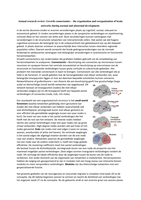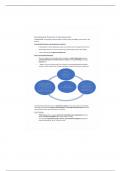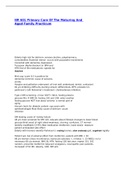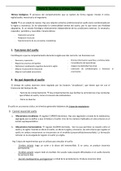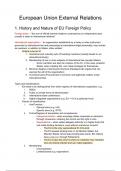Persoonlijkheidspsychologie Mara Mariman
PERSOONLIJKHEIDSPSYCHOLOGIE
INHOUDSOPGAVE
Les 1: inleiding ......................................................................................................................................................... 9
1. Definitie persoonlijkheid ................................................................................................................................. 9
2. Terminologie ................................................................................................................................................. 10
3. Persoonlijkheidspsychologie ......................................................................................................................... 11
3.1 Drie analyseniveaus ............................................................................................................................. 12
3.2 Theorie VS. Onderzoek ........................................................................................................................ 12
Les 2 dispositionele theorieën .............................................................................................................................. 14
1. Wat zijn PH-trekken ...................................................................................................................................... 14
1.1 Verschillende visies definitie trek ........................................................................................................ 14
2. identificeren van trekken .............................................................................................................................. 14
2.1 LEXICALE BENADERING ............................................................................................................................... 14
2.2 statistische benadering ............................................................................................................................... 14
2.3 Theoretische benadering ............................................................................................................................ 15
3. Evolutie van trek theorieën ........................................................................................................................... 15
3.1 GORDON ALLPORT (1897-1967) .................................................................................................................. 15
3.2 RAYMOND CATTELL (1905-1998) ................................................................................................................ 16
3.3 Hans Eysenck ( 1916-1998) ......................................................................................................................... 16
4. Five- factory model ....................................................................................................................................... 17
4.1 FISKE (1949): eerste versie van de 5 factoren ............................................................................................. 17
4.2 Paul T. costa & Robert R. Mccrae ................................................................................................................ 17
4.3 Empirische ondersteuning .......................................................................................................................... 21
4.4 De vijfde factor ............................................................................................................................................ 21
4.5 Is het VFM volledig? .................................................................................................................................... 21
4.6 Evaluatie van het VFM ................................................................................................................................ 22
5. Five- Factory Theory ...................................................................................................................................... 22
5.1 Five Factor-Theory (McCrae & costa, 1996) ........................................................................................ 22
5.2 Centrale componenten van de FFT( onderdelen van de kader) .......................................................... 22
5.3 PERIFERE COMPONENTEN VAN DE FFT ............................................................................................... 23
5.4 basisuitgangspunten van de FFT.......................................................................................................... 23
Les 3: biologische theorieën ................................................................................................................................. 24
1. Hans Eysenck (1916-1998) ............................................................................................................................ 24
1.2 BIOLOGISCHE BASIS INTROVERT VS. EXTRAVERT ................................................................................ 24
2. Jeffrey Gray (1934-2004)............................................................................................................................... 25
1
,Persoonlijkheidspsychologie Mara Mariman
3. Robert cloninger (1944-…) ............................................................................................................................ 26
3.1 Neurotransmitters en persoonlijkheid ........................................................................................................ 26
3.2 Temperamentdimensies ...................................................................................................................... 27
3.3 Biologisch model cloninger .................................................................................................................. 27
3.4 kritiek biologsich model cloninger ....................................................................................................... 27
4. Empirische evidentie? ................................................................................................................................... 27
les 4: psychodynamische theorieën ...................................................................................................................... 28
1. Klassieke psychoanalyse................................................................................................................................ 28
1.1 Structuur van persoonlijkheid ............................................................................................................. 30
1.1.1 ID: vat vol psychische energie ......................................................................................................... 30
1.1.2 EGO: uitvoerende macht ................................................................................................................. 30
1.1.3 SUPEREGO: moraalridder ................................................................................................................ 30
1.2 Dynamiek van persoonlijkheid ............................................................................................................ 30
1.2.1 soorten angst .................................................................................................................................. 31
1.2.2 afweermechanismen ....................................................................................................................... 31
1.3 psychoseksuele ontwikkeling van de persoonlijkheid ......................................................................... 32
1.4 psychoanalytische therapie ................................................................................................................. 32
1.4.1 vrije associatie ................................................................................................................................. 32
1.4.2 dromen ............................................................................................................................................ 33
1.4.3 projectieve technieken .................................................................................................................... 33
1.4.4 het psychoanalytische proces ......................................................................................................... 33
1.5 Evaluatie van de psychoanalyse .......................................................................................................... 33
1.5.1 BELANG VAN PSYCHOANALYSE ....................................................................................................... 33
1.5.2 kritiek op psychoanalyse ................................................................................................................. 33
2. Neo-analytische beweging ............................................................................................................................ 33
2.1 het onbewuste ..................................................................................................................................... 34
3. egopsychologie ............................................................................................................................................. 34
3.1 Erik Erikson (1902–1994) ..................................................................................................................... 34
3.2 Karen Horny ( 1885-1952) ................................................................................................................... 34
4. Objectrelatietheorie ...................................................................................................................................... 35
4.1 Mary Ainsworth (1913- 1999) ............................................................................................................. 35
4.2 Hechting in volwassenen relaties ........................................................................................................ 35
Les 5: Humanistische theorieën ............................................................................................................................ 38
1. Abraham Maslow (1908-1970) ..................................................................................................................... 38
1.2 behoefte piramide....................................................................................................................................... 38
1.3 zelfontplooiing/ zelfactualisatie .......................................................................................................... 38
2. Carl Rogers ( 1902-1987) ............................................................................................................................... 39
2
,Persoonlijkheidspsychologie Mara Mariman
2.1 clientgerichte psychotherapie ............................................................................................................. 39
les 6: sociaal- cognitieve leertheorie..................................................................................................................... 39
1. persoonlijke constructtheorie ....................................................................................................................... 39
1.1 postmodernisme ................................................................................................................................. 39
1.2 Persoonlijke constructen ..................................................................................................................... 39
1.3 Fundamenteel postulaat (1955) .......................................................................................................... 40
1.4 11 implicaties (‘corollaries’) ................................................................................................................. 40
2. Sociaal- cognitieve leertheorieën:................................................................................................................. 40
2.1 ALBERT BANDURA (1925 - …) WEDERZIJDS DETERMINISME .............................................................. 40
2.2 JULIAN ROTTER (1916 – 2014) EXPECTANCY–VALUE THEORY & LOCUS OF CONTROL ............................... 41
2.2 WALTER MISCHEL (1930 - 2018) CAPS ................................................................................................ 41
2.3 Cognitief-affectief persoonlijkheidssysteem (1995): ........................................................................... 42
1. Informatiebronnen m.b.t persoonlijkheid .................................................................................................... 42
1.1 zelfrapportage (self-report data) ......................................................................................................... 42
1.1.1 ongestructureerde PH-tests ............................................................................................................ 42
1.1.2 gestructureerde PH-tests ................................................................................................................ 43
1.1.3 Experience sampling........................................................................................................................ 43
1.1.4 Beperkingen zelfrapportage: ........................................................................................................... 43
1.2 observatie (O-data) .............................................................................................................................. 44
1.3 testdata (T-data) .................................................................................................................................. 44
1.3.1 beperkingen t-data .......................................................................................................................... 44
1.3.2 mechanische opnameapparatuur ................................................................................................... 45
1.3.3 Fysiologische data ........................................................................................................................... 45
1.3.4 projectieve tests .............................................................................................................................. 45
1.4 Anamnestische gegevens (L-data) ....................................................................................................... 46
1.4.1 combineren van soorten data ......................................................................................................... 46
2. evaluatie van meetinstrumenten .................................................................................................................. 46
3. Ontwikkeling van meetinstrumenten ........................................................................................................... 46
3.1 Aggregatie............................................................................................................................................ 47
4. onderzoeksdesign in persoonlijkheidspsychologie ....................................................................................... 47
4.1 gevalstudie (case study) ...................................................................................................................... 47
4.1.1 gevalstudie: Ted Bundy ................................................................................................................... 47
5. methodologische kwesties ............................................................................................................................ 47
5.1 onzorgvuldigheid ................................................................................................................................. 47
5.2 centrale antwoordtendentie ............................................................................................................... 48
5.3 ‘faking’ op vragenlijsten....................................................................................................................... 48
5.4 bamum statements ............................................................................................................................. 48
3
, Persoonlijkheidspsychologie Mara Mariman
Les 7: hedendaagse thema’s= consistentie en stabiliteit van persoonlijkheid ..................................................... 48
1. Cross-situationele consistentie ..................................................................................................................... 48
1.1 drie vormen van P-S interactie ............................................................................................................ 49
2. temporele stabiliteit...................................................................................................................................... 49
2.1 basisbegrippen .................................................................................................................................... 49
2.2 Persoonlijkheidsstabiliteit in baby-, peuter- en kindertijd en adolescentie ........................................ 49
2.2.1 Temperament als basis voor individuele verschillen ...................................................................... 49
2.2.2 stabiliteit in de baby-en peutertijd.................................................................................................. 49
2.2.3 DUnedin Multidisciplinary Health and Development study ............................................................ 51
2.2.4 Ph stabiliteit in de kindertijd vfm maat ........................................................................................... 52
2.2.5 besluit: (reangorde) stabiliteit tijdens de kindertijd ....................................................................... 54
2.3 persoonlijkheidsstabiliteit in de volwassenheid .................................................................................. 54
2.3.1 costa & mccrae (1994) .................................................................................................................... 54
2.3.2 Meta-analyse Roberts en DelVecchio (2001) .................................................................................. 55
2.3.3 Specht et al. (2011) ......................................................................................................................... 56
2.3.4 absolute verandering in de volwassenheid ..................................................................................... 56
2.3.5 persoonlijkheidsverandering na therapie (de fruyt et al, 2006) ..................................................... 56
2.4 Ph-coherentie ...................................................................................................................................... 57
les 8: hedendaagse thema’s= gedragsgenetica en persoonlijkheid ...................................................................... 57
1. het menselijk genoom ................................................................................................................................... 58
2. controverse over genen en PH ...................................................................................................................... 59
3. doel van gedragsgenatica.............................................................................................................................. 59
4. wat is erfelijkheid? ........................................................................................................................................ 59
4.1 misvattingen over erfelijkheid ............................................................................................................. 59
4.2 ‘nature- nurture’ debat........................................................................................................................ 60
5. gedragsgenetisch onderzoek ........................................................................................................................ 60
5.1 selectief kweken .................................................................................................................................. 60
5.2 familieonderzoek ................................................................................................................................. 60
5.3 tweelingonderzoek -> formule goed kennen!! ................................................................................... 61
5.4 adoptieonderzoek................................................................................................................................ 62
6. onderzoeksbevindingen ................................................................................................................................ 63
6.1 minnesota twin study .......................................................................................................................... 63
6.2 conclusies ............................................................................................................................................ 64
7. gedeelde vs. niet-gedeelde omgevingsinvloeden ......................................................................................... 64
8. genen en omgeving ....................................................................................................................................... 64
8.1 genotype-omgevingsinteractie ............................................................................................................ 64
les 9: hedendaagse thema’s= identiteit en zelfconcept en coping ....................................................................... 65
4
PERSOONLIJKHEIDSPSYCHOLOGIE
INHOUDSOPGAVE
Les 1: inleiding ......................................................................................................................................................... 9
1. Definitie persoonlijkheid ................................................................................................................................. 9
2. Terminologie ................................................................................................................................................. 10
3. Persoonlijkheidspsychologie ......................................................................................................................... 11
3.1 Drie analyseniveaus ............................................................................................................................. 12
3.2 Theorie VS. Onderzoek ........................................................................................................................ 12
Les 2 dispositionele theorieën .............................................................................................................................. 14
1. Wat zijn PH-trekken ...................................................................................................................................... 14
1.1 Verschillende visies definitie trek ........................................................................................................ 14
2. identificeren van trekken .............................................................................................................................. 14
2.1 LEXICALE BENADERING ............................................................................................................................... 14
2.2 statistische benadering ............................................................................................................................... 14
2.3 Theoretische benadering ............................................................................................................................ 15
3. Evolutie van trek theorieën ........................................................................................................................... 15
3.1 GORDON ALLPORT (1897-1967) .................................................................................................................. 15
3.2 RAYMOND CATTELL (1905-1998) ................................................................................................................ 16
3.3 Hans Eysenck ( 1916-1998) ......................................................................................................................... 16
4. Five- factory model ....................................................................................................................................... 17
4.1 FISKE (1949): eerste versie van de 5 factoren ............................................................................................. 17
4.2 Paul T. costa & Robert R. Mccrae ................................................................................................................ 17
4.3 Empirische ondersteuning .......................................................................................................................... 21
4.4 De vijfde factor ............................................................................................................................................ 21
4.5 Is het VFM volledig? .................................................................................................................................... 21
4.6 Evaluatie van het VFM ................................................................................................................................ 22
5. Five- Factory Theory ...................................................................................................................................... 22
5.1 Five Factor-Theory (McCrae & costa, 1996) ........................................................................................ 22
5.2 Centrale componenten van de FFT( onderdelen van de kader) .......................................................... 22
5.3 PERIFERE COMPONENTEN VAN DE FFT ............................................................................................... 23
5.4 basisuitgangspunten van de FFT.......................................................................................................... 23
Les 3: biologische theorieën ................................................................................................................................. 24
1. Hans Eysenck (1916-1998) ............................................................................................................................ 24
1.2 BIOLOGISCHE BASIS INTROVERT VS. EXTRAVERT ................................................................................ 24
2. Jeffrey Gray (1934-2004)............................................................................................................................... 25
1
,Persoonlijkheidspsychologie Mara Mariman
3. Robert cloninger (1944-…) ............................................................................................................................ 26
3.1 Neurotransmitters en persoonlijkheid ........................................................................................................ 26
3.2 Temperamentdimensies ...................................................................................................................... 27
3.3 Biologisch model cloninger .................................................................................................................. 27
3.4 kritiek biologsich model cloninger ....................................................................................................... 27
4. Empirische evidentie? ................................................................................................................................... 27
les 4: psychodynamische theorieën ...................................................................................................................... 28
1. Klassieke psychoanalyse................................................................................................................................ 28
1.1 Structuur van persoonlijkheid ............................................................................................................. 30
1.1.1 ID: vat vol psychische energie ......................................................................................................... 30
1.1.2 EGO: uitvoerende macht ................................................................................................................. 30
1.1.3 SUPEREGO: moraalridder ................................................................................................................ 30
1.2 Dynamiek van persoonlijkheid ............................................................................................................ 30
1.2.1 soorten angst .................................................................................................................................. 31
1.2.2 afweermechanismen ....................................................................................................................... 31
1.3 psychoseksuele ontwikkeling van de persoonlijkheid ......................................................................... 32
1.4 psychoanalytische therapie ................................................................................................................. 32
1.4.1 vrije associatie ................................................................................................................................. 32
1.4.2 dromen ............................................................................................................................................ 33
1.4.3 projectieve technieken .................................................................................................................... 33
1.4.4 het psychoanalytische proces ......................................................................................................... 33
1.5 Evaluatie van de psychoanalyse .......................................................................................................... 33
1.5.1 BELANG VAN PSYCHOANALYSE ....................................................................................................... 33
1.5.2 kritiek op psychoanalyse ................................................................................................................. 33
2. Neo-analytische beweging ............................................................................................................................ 33
2.1 het onbewuste ..................................................................................................................................... 34
3. egopsychologie ............................................................................................................................................. 34
3.1 Erik Erikson (1902–1994) ..................................................................................................................... 34
3.2 Karen Horny ( 1885-1952) ................................................................................................................... 34
4. Objectrelatietheorie ...................................................................................................................................... 35
4.1 Mary Ainsworth (1913- 1999) ............................................................................................................. 35
4.2 Hechting in volwassenen relaties ........................................................................................................ 35
Les 5: Humanistische theorieën ............................................................................................................................ 38
1. Abraham Maslow (1908-1970) ..................................................................................................................... 38
1.2 behoefte piramide....................................................................................................................................... 38
1.3 zelfontplooiing/ zelfactualisatie .......................................................................................................... 38
2. Carl Rogers ( 1902-1987) ............................................................................................................................... 39
2
,Persoonlijkheidspsychologie Mara Mariman
2.1 clientgerichte psychotherapie ............................................................................................................. 39
les 6: sociaal- cognitieve leertheorie..................................................................................................................... 39
1. persoonlijke constructtheorie ....................................................................................................................... 39
1.1 postmodernisme ................................................................................................................................. 39
1.2 Persoonlijke constructen ..................................................................................................................... 39
1.3 Fundamenteel postulaat (1955) .......................................................................................................... 40
1.4 11 implicaties (‘corollaries’) ................................................................................................................. 40
2. Sociaal- cognitieve leertheorieën:................................................................................................................. 40
2.1 ALBERT BANDURA (1925 - …) WEDERZIJDS DETERMINISME .............................................................. 40
2.2 JULIAN ROTTER (1916 – 2014) EXPECTANCY–VALUE THEORY & LOCUS OF CONTROL ............................... 41
2.2 WALTER MISCHEL (1930 - 2018) CAPS ................................................................................................ 41
2.3 Cognitief-affectief persoonlijkheidssysteem (1995): ........................................................................... 42
1. Informatiebronnen m.b.t persoonlijkheid .................................................................................................... 42
1.1 zelfrapportage (self-report data) ......................................................................................................... 42
1.1.1 ongestructureerde PH-tests ............................................................................................................ 42
1.1.2 gestructureerde PH-tests ................................................................................................................ 43
1.1.3 Experience sampling........................................................................................................................ 43
1.1.4 Beperkingen zelfrapportage: ........................................................................................................... 43
1.2 observatie (O-data) .............................................................................................................................. 44
1.3 testdata (T-data) .................................................................................................................................. 44
1.3.1 beperkingen t-data .......................................................................................................................... 44
1.3.2 mechanische opnameapparatuur ................................................................................................... 45
1.3.3 Fysiologische data ........................................................................................................................... 45
1.3.4 projectieve tests .............................................................................................................................. 45
1.4 Anamnestische gegevens (L-data) ....................................................................................................... 46
1.4.1 combineren van soorten data ......................................................................................................... 46
2. evaluatie van meetinstrumenten .................................................................................................................. 46
3. Ontwikkeling van meetinstrumenten ........................................................................................................... 46
3.1 Aggregatie............................................................................................................................................ 47
4. onderzoeksdesign in persoonlijkheidspsychologie ....................................................................................... 47
4.1 gevalstudie (case study) ...................................................................................................................... 47
4.1.1 gevalstudie: Ted Bundy ................................................................................................................... 47
5. methodologische kwesties ............................................................................................................................ 47
5.1 onzorgvuldigheid ................................................................................................................................. 47
5.2 centrale antwoordtendentie ............................................................................................................... 48
5.3 ‘faking’ op vragenlijsten....................................................................................................................... 48
5.4 bamum statements ............................................................................................................................. 48
3
, Persoonlijkheidspsychologie Mara Mariman
Les 7: hedendaagse thema’s= consistentie en stabiliteit van persoonlijkheid ..................................................... 48
1. Cross-situationele consistentie ..................................................................................................................... 48
1.1 drie vormen van P-S interactie ............................................................................................................ 49
2. temporele stabiliteit...................................................................................................................................... 49
2.1 basisbegrippen .................................................................................................................................... 49
2.2 Persoonlijkheidsstabiliteit in baby-, peuter- en kindertijd en adolescentie ........................................ 49
2.2.1 Temperament als basis voor individuele verschillen ...................................................................... 49
2.2.2 stabiliteit in de baby-en peutertijd.................................................................................................. 49
2.2.3 DUnedin Multidisciplinary Health and Development study ............................................................ 51
2.2.4 Ph stabiliteit in de kindertijd vfm maat ........................................................................................... 52
2.2.5 besluit: (reangorde) stabiliteit tijdens de kindertijd ....................................................................... 54
2.3 persoonlijkheidsstabiliteit in de volwassenheid .................................................................................. 54
2.3.1 costa & mccrae (1994) .................................................................................................................... 54
2.3.2 Meta-analyse Roberts en DelVecchio (2001) .................................................................................. 55
2.3.3 Specht et al. (2011) ......................................................................................................................... 56
2.3.4 absolute verandering in de volwassenheid ..................................................................................... 56
2.3.5 persoonlijkheidsverandering na therapie (de fruyt et al, 2006) ..................................................... 56
2.4 Ph-coherentie ...................................................................................................................................... 57
les 8: hedendaagse thema’s= gedragsgenetica en persoonlijkheid ...................................................................... 57
1. het menselijk genoom ................................................................................................................................... 58
2. controverse over genen en PH ...................................................................................................................... 59
3. doel van gedragsgenatica.............................................................................................................................. 59
4. wat is erfelijkheid? ........................................................................................................................................ 59
4.1 misvattingen over erfelijkheid ............................................................................................................. 59
4.2 ‘nature- nurture’ debat........................................................................................................................ 60
5. gedragsgenetisch onderzoek ........................................................................................................................ 60
5.1 selectief kweken .................................................................................................................................. 60
5.2 familieonderzoek ................................................................................................................................. 60
5.3 tweelingonderzoek -> formule goed kennen!! ................................................................................... 61
5.4 adoptieonderzoek................................................................................................................................ 62
6. onderzoeksbevindingen ................................................................................................................................ 63
6.1 minnesota twin study .......................................................................................................................... 63
6.2 conclusies ............................................................................................................................................ 64
7. gedeelde vs. niet-gedeelde omgevingsinvloeden ......................................................................................... 64
8. genen en omgeving ....................................................................................................................................... 64
8.1 genotype-omgevingsinteractie ............................................................................................................ 64
les 9: hedendaagse thema’s= identiteit en zelfconcept en coping ....................................................................... 65
4


